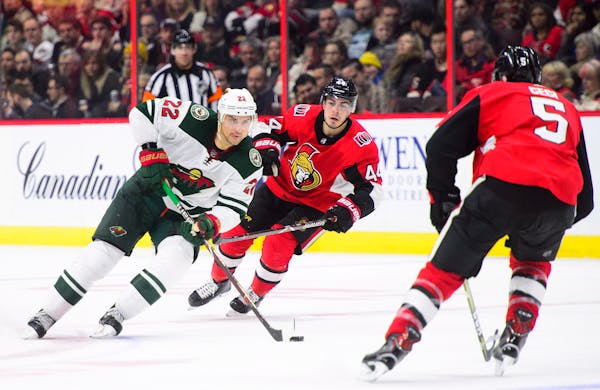SUNRISE, FLA. - When Wild goalie Devan Dubnyk was sidelined with injury last week, coach Bruce Boudreau figured the absence of his starter wouldn't be felt immediately.
"The teams get by the first week or two because they play above what they're capable of because they know great players are out," Boudreau said.
While the Wild hasn't gone on a tear while Dubnyk deals with a lower-body injury a source said was a minor knee issue, it hasn't imploded, either, at 2-2.
Boudreau's reasoning could explain the team's successes in that span, but backup Alex Stalock also appears to be a factor — not just for his play, as he's stopped 124 of 134 shots in four starts, but also the effect he seems to have on his teammates when he's on the ice.
"As players, we all understand that it's not fun to not be playing," center Matt Cullen said. "So a guy that keeps a really strong, good, positive attitude and is a good guy, good teammate, it's easy to get behind a guy like that because he doesn't get this opportunity often.
"And when it does come, you want to put your best out there for him and you want to see him win."
A backup goalie isn't the only position that practices more than it plays, as a 13th forward or seventh defenseman follows a similar script.
Scratches and players recovering from injury are often the ones on the ice with the backup long after the formal portion of practice has concluded, and the additional time they spend rehearsing reps merits respect — especially for Stalock, since he's the one facing those extra pucks.
"He battles on every shot in practice no matter if it's a rebound or a third rebound," winger Jason Zucker said. "He's trying to save it. It's much better that way than having a goalie go through the motions. It's good to see that, and it just shows that he cares and wants to make everyone better."
It can be easier, though, for a forward or defenseman to find himself back in the lineup, since there's many more possibilities of who he could replace and teams may choose to utilize a rotation — a tactic the Wild has employed lately with its forward group.
But the No. 2 option in net has only one way into the action and since many No. 1s play at least 60-65 games a season, his running mate could go weeks between starts — all the while preparing to be ushered onto the ice at a moment's notice.
In the meantime, it's still possible to make an impact while being idle.
Former NHL goaltender and current NHL Network analyst Kevin Weekes focused on that when he was tasked with backing up Henrik Lundqvist with the Rangers from 2005-07.
"Whether it's talking on the bench, whether it's helping guys in the room, whether it's saying something, whether it's supporting a goalie … I gotta add value here," Weekes said. "You can't add value by playing because you're not in the net. So try to find other ways to add value."
This approach not only keeps a goalie engaged in the process, but it stokes that bond among the players in front of him — a camaraderie Stalock seems to have established as a likable, upbeat personality.
"What a monumental difference that can make on an overall team psyche," said Marty Turco, a former NHL goalie who was a backup and a starter — mostly with the Stars. "So when the time does come for a daily backup to go in and play, the boys want him to win if he comes up. He's the first one on the ice. He's the last one off. … He's just there, no matter how tired he is. He's in the weight room, and he is a fun guy because he's positive.
"That, to me, is what makes hockey so great and why I love the goaltending position so much."
This job seems even more unique amid the reality that backups want to be starters, an evolution, however, that can't be predicted.
The experience of being an understudy can certainly help that pursuit, and so can the team-first attitude because that's important regardless of where a player slots in the hierarchy.
"You want the team to do well," Stalock said. "Whatever it takes for the team to succeed, whether you're hot for a little bit or the other guy's hot and you're sitting on the bench for two weeks. As long as you're winning, everybody gets better."
Elias Díaz gets key hit as the Rockies rally for a wild 10-9 victory over the Padres
Live: Vikings first-round draft updates, news and analysis

Wolves' Edwards displays growth, even when his shot isn't falling
G Javian McCollum transferring to Georgia Tech after leading Oklahoma hoops in scoring

